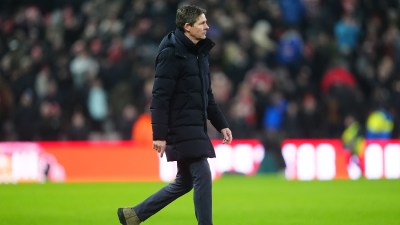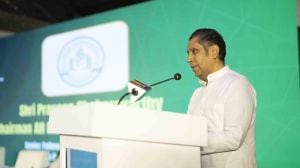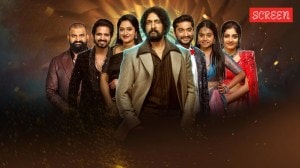Warning note on Hindutva
THE ECONOMIST was contemplating the retreating swathes of saffron after the VHP8217;s 8216;8216;dharam sansad8217;8217; wound up in New...

THE ECONOMIST was contemplating the retreating swathes of saffron after the VHP8217;s 8216;8216;dharam sansad8217;8217; wound up in New Delhi. As the faithful made their way back home, with nothing to show for their strenuous shouting but a sit-in near Parliament, the magazine warned that appearances can deceive. 8216;8216;Victory had apparently eluded them. They are not alone, however, in thinking that it is within their reach.8217;8217; It pointed to the greater activism over 8216;8216;Hindu8217;8217; issues after Modi8217;s victory in Gujarat.
The British and American media reported the Allahabad High Court8217;s excavation order in varying tones of scepticism. The WASHINGTON POST suggested it might set a dangerous precedent. The GUARDIAN contended that temples and mosques in India have traditionally been built on sites of older buildings.
Different images of Islam
In TIME, the predicament of India8217;s Muslims was the pivot of a story about Muslim minorities under siege across Asia. It said that the plight of Indian Muslims 8212; 8216;8216;they have never felt more vulnerable and persecuted8217;8217; 8212; is shared in varying degrees by China8217;s Turkic-speaking Uighurs, the Rohingyas in Burma, Muslims of Sri Lanka8217;s Eastern province.
The look at Muslim minorities was part of an ambitious enterprise by the magazine to frame different images of Islam in Asia to show that Muslims cannot 8212; and should not 8212; be stereotyped. In a lively essay, novelist Mohsin Hamid proposed a new, 8216;8216;more useful8217;8217; division of the world: between those who think that conflict between Muslims and non-Muslims is desirable and those who think it is not.
Of Gods and Presidents
Religion seemed uppermost in many minds as the drumbeats of war sounded louder. NEWSWEEK8217;s cover story attempted a 8216;8216;faith portrait8217;8217; of George W. Bush. The man who rises ahead of dawn most days, to read a book of evangelical mini-sermons. In a White House suffused with an 8216;8216;aura of prayerfulness8217;8217;.
8216;8216;Never have we historians been busier making sense of presidential God talk than now,8217;8217; wrote Martin E. Marty, professor emeritus at the university of Chicago. He said that after September 11 and the US President8217;s decision to attack Iraq, the talk that other nations may have found 8216;8216;mildly amusing or merely arrogant8217;8217; has taken on an international and historical resonance.
Diplomatic failure, military might
In the run-up to the Security Council vote on Iraq, is an increasingly louder buzz in the US media about America8217;s isolation. Especially after the jolting refusal of Turkey8217;s Parliament to let US troops strike from that country despite the handsome bribe offered by the US. And the joint statement by France, Russia and Germany that they would block a resolution giving the go-ahead to military action.
There was some handwringing. And bristling calls to march on nevertheless. 8216;8216;The scale of the failure of US diplomacy 8230; is staggering,8217;8217; wrote columnist Jim Hoagland in THE WASHINGTON POST. But now, 8216;8216;soldiers must chart the path out of the clouded 8216;context8217; the politicians and diplomats have created8230;8217;8217; Failed US diplomacy, he exhorted, must give way to a 8216;8216;clear war strategy8217;8217;.
Sen and sensibility on famines
Another bleak crisis swam briefly into focus when the NEW YORK TIMES locked horns with Amartya Sen8217;s assertion that famines do not occur in democracies.
What about those reports of starvation from Sen8217;s own site of research, asked Michael Massing in the NYT. He pointed to states like drought-ravaged Rajasthan and Orissa. Where thousands have died against a backdrop of endemic hunger and malnutrition and millions go hungry to bed every night while the government sits on a grain surplus of more than 50 million tonnes.
Sen protested that he was misunderstood: 8216;8216;We must distinguish between the role of democracy in preventing famine and the comparative ineffectiveness of democracy in preventing regular undernourishment8217;8217;. That didn8217;t deter his critics. They accused him of naivete about how democracies work. Others faulted him for being preoccupied with limited public works programmes and not taking on the big political questions. Yet others contended that political freedoms need to be complemented by economic liberalisation.
All the critics of Sen agreed that democracy is no cure-all 8212; a view Sen himself concurs with. The last word in the debate belonged to Sen: 8216;8216;The key, he said, is not to jettison democracy but to find ways of making it work better for society8217;s underdogs.8217;8217;
- 01
- 02
- 03
- 04
- 05






























